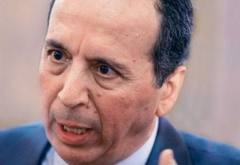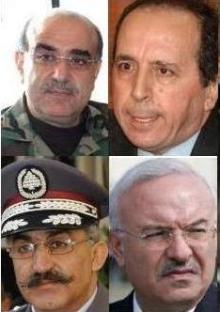 MP Jamil al-Sayyed, the controversial former General Security chief, on Monday demanded that the justice ministerial portfolio be allocated to his pro-Syrian political camp.
MP Jamil al-Sayyed, the controversial former General Security chief, on Monday demanded that the justice ministerial portfolio be allocated to his pro-Syrian political camp.
“The meeting with PM(-designate) Saad Hariri was normal and it involved a brief discussion about the 2005 period and its events,” al-Sayyed said after meeting Hariri as part of protocol parliamentary consultations related to the formation of the new cabinet.
“Hariri dealt with me as if there has never been a problem between us,” the major general added.
Born in the Bekaa village of al-Nabi Eila, Sayyed has a long political history that has garnered much media attention. This has been especially true in the past 11 years, as he was imprisoned on suspicion of involvement in the 2005 assassination of former Prime Minister Rafik Hariri and then later released due to lack of evidence.
Sayyed’s past is littered with incidents showing his opposition to president Michel Aoun, including instances in which police and intelligence agents oppressed Aoun supporters who were demonstrating against the Syrian presence in Lebanon, when Aoun was in self exile in France
Former President Emile Lahoud appointed Sayyed as the head of General Security. The two who were closely allied with the Syrian regime worked very closely together..

Following Hariri’s assassination the Cedar Revolution demonstrators demanded that Sayyed resign. He handed his position as head of General Security over to his deputy, Asaad Taesh, on May 5, 2005 . On August 25, Sayyed was arrested on suspicion of involvement in Hariri’s murder. He was held in prison for four years.
After the meeting with Hariri on Monday , Sayyed said the new government should be inclusive as much as possible.
“The ministerial policy statement should endorse the resistance,” al-Sayyed added, in a possible reference to his ally the Iranian backed Hezbollah militant group.
Consultations and wish lists
Hariri on Monday held one-day, unbinding consultations with the parliamentary blocs and deputies in Nejmeh Square, kicking off his bid to form a new government.
Hariri first met with Speaker Nabih Berri, and afterwards met separately with former PM Tammam Salam and ex-PM Najib Miqati.
Salam made remarks to reporters after the meeting saying “although everyone is calling for a quick Cabinet formation , I don’t think it should be rushed.”
The PM-designate then started receiving the various parliamentary blocs. He met with Amal’s Development and Liberation bloc that stressed “commitment to the Constitution, preserving Lebanon’s sovereignty and seeking the formation of a national body to abolish political sectarianism.”
He then met with al-Mustaqbal bloc and FPM’s Strong Lebanon bloc that called for adding two more portfolios to the Cabinet.
The Strong Lebanon bloc demanded that minority groups, the Alawite and Syriac communities, be represented in the Cabinet, saying the bloc wants six ministerial portfolios other than the President’s share and the allocation of either the finance or interior ministry to the Free Patriotic Movement.
Hariri then met Hezbollah’s Loyalty to Resistance bloc, Jumblatt’s Democratic Gathering bloc, the Phalange party bloc and the Strong Republic bloc of the Lebanese Forces. The LF’s bloc demanded a share of the ministerial seats allocated to the President, arguing that it had “played a key role in his election.”
“We wished success for PM-designate Hariri and we want everyone to show positivity to give a real chance to the country. Today the entire country is on the same boat and if it sinks we will all drown,” Phalange Party chief MP Sami Gemayel said after the talks.
“We care about programs and priorities more than individuals and we will take the right stance accordingly,” he added.
MP Mohammed Raad said Hezbollah’s bloc “welcomed the designation of PM-designate Saad Hariri to form the government and stressed its willingness for positive cooperation with him.”
“As for portfolios, the bloc said it has the right to have a key portfolio and also stressed the need to create a public planning ministry for the country in order to clearly define the long-term course that the country would take in a correct and appropriate manner,” Raad added.
Hezbollah and its allies were the only ones that did not vote for Hariri’s designation as PM.
MP Talal Arslan meanwhile stressed that his Mountain Guarantee bloc should be represented by a Druze minister.
“The results of the parliamentary elections led to the formation of two blocs in Mount Lebanon and they have the right to be represented,” Arslan added.
MP Hagop Pakradounian of the Armenian MPs bloc meanwhile demanded the formation of a 32-member Cabinet and the allocation of two portfolios to the Armenian community.
According to a report by al-Joumhouria daily , the various political parties are eager for an “expedited” formation of a “national unity government” able of confronting the “danger facing Lebanon’s economic and financial system,”
The Progressive Socialist Party (of Walid Jumblatt) is demanding the allocation of all three Druze seats to the PSP, which would keep Arslan out of the government.
The PSP argues that they kept a place for Arslan on their electoral list during the parliamentary elections, but he chose instead to strike an alliance with the FPM.
Another obstacle that could be facing the formation is the dispute between the Free Patriotic Movement and the Lebanese Forces over the Christian shares and portfolios. LF was the biggest winner in the parliamentary election it almost doubled its number of seats from 8 to 15
Furthermore, the daily said Hariri “will not enter into details during his consultations so as not to commit himself to anything in advance, but rather to listen more than talk.”

Leave a Reply
You must be logged in to post a comment.